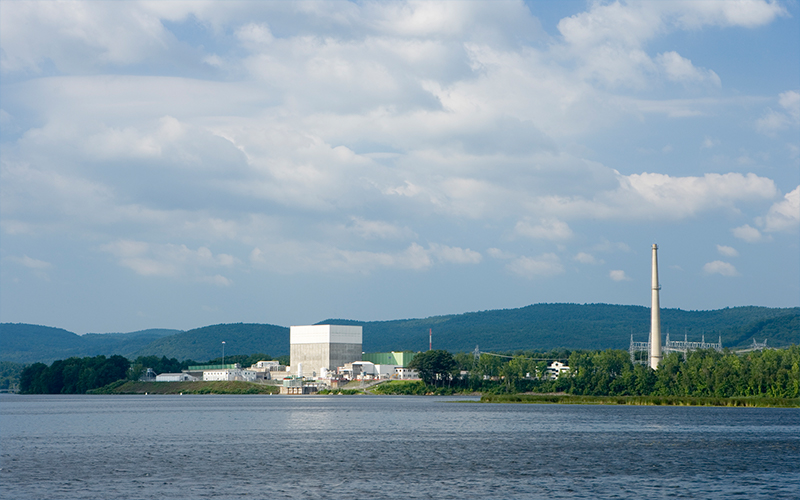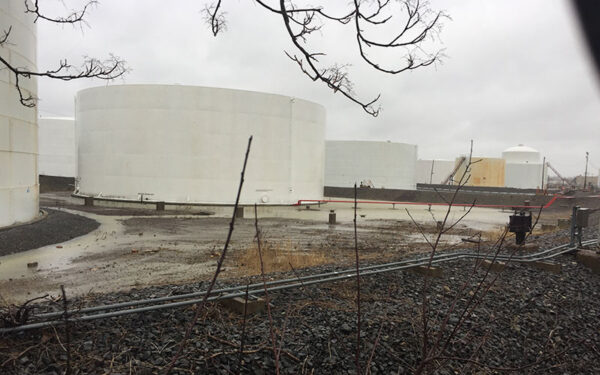
Now that Vermont Yankee has shut down, we're turning to the safe decommissioning of the former nuclear power plant. Photo: EcoPhotography
UPDATE: A public hearing on the planned transfer of the shuttered Vermont Yankee nuclear plant will occur on April 12 at 7:00 p.m. at Brattleboro Union High School. Starting at 6:00 p.m., the Vermont Department of Public Service will hold an information session. Although some new terms have been added to sweeten the deal, the underlying plan remains a raw deal for Vermont.
Cleaning up closed nuclear power plants is a vexing problem. The sites are contaminated and will remain so for decades, if not centuries.
The Vermont Yankee Nuclear Power plant closed in 2014. Now, the current owners, Entergy, plan to transfer everything to a new owner, Northstar, in exchange for $1,000. You can read the Vermont petition here.
CLF is participating in the more technical aspects of the case, focusing on the failure of the plan to have the money needed to get the job done. (You can read about this and other shortcomings of the proposed plan, as well as our testimony, here.)
Once transferred, Northstar will take on the burden to clean up the site. The company has expressed vague hopes, but no commitment, to get the job done sooner than Entergy had planned (but still not before 2030). It will have use of the decommissioning funds that electricity customers set aside for the plant’s closure, but the funds available are not enough to clean up the site any time soon. Nuclear Regulatory Commission rules allow owners to put plants in a form of storage for up to 60 years, allowing the funds to increase in value.
Sadly, Vermont Yankee’s “retirement” fund is simply not adequate for a prompt clean up. This should all leave folks wondering why would Northstar want to buy Vermont Yankee and take on this burden and its inherent risks? And why should Entergy be off the hook for its mess? What happens if things don’t go as planned?
These are good questions. And they need to be answered before this sale moves forward.
The Vermont Public Utilities Commission needs to approve the transfer to Northstar. You can make your voice heard during an upcoming presentation and public hearing.
CLF will be there and we hope you will be, too. If you can’t attend in person (or even if you can), then you can submit written comments on the Public Utilities Commission’s website. Or by sending an email to puc.clerk@vermont.gov. Be sure to include “Docket #8880” in any written comment. The public hearing and comments allow people to express their concerns to regulators and let them know which issues are important.
Vermont is no stranger to the legacy of pollution left behind by old power and industrial plants. From the PFOA contamination in Bennington to the Barge Canal in Burlington, and the battery plant in St. Albans, no corner of Vermont is spared.
While a quicker restoration of the Vermont Yankee site would be good, regulators need to make sure that there is enough money, effective incentives, and oversight to get the job done, and done well.
When it comes to Vermont Yankee, Vermonters have already been burned once by promises that were not kept, polluting leaks that were hidden and management that failed to address serious problems. Succumbing again to vague or unenforceable promises would be foolhardy. When it comes to closing nuclear plants, cost overruns are the norm. The unexpected is expected. Staying on budget or on time is too often a dream rather than a reality. Adequate funds need to be available to deal with problems when they arise.
Entergy owns other nuclear plants that will be closing soon, including the Pilgrim Nuclear Facility in Massachusetts. What happens at Vermont Yankee may be a model for future clean-ups. It is important to get this one right and not allow Vermont’s environment and communities to be guinea pigs for a new endeavor that runs the risk of falling apart and leaves Vermont with yet another polluted mess.
Key points to raise at the public hearing or in comments include:
- Timing – The timing of the clean-up should be a firm commitment. No vague promise to get the job done sooner.
- Money – Northstar should have financial backing and insurance to cover all costs and contingencies if things do not go as planned. The added money should be available until all the work is done.
- Entergy – As the plant owner when it was operating, Entergy should not be off the hook. The site is contaminated now and had leaks when Entergy was running the plant. If the proposed sale is so good, Entergy should stand more firmly behind it and remain financially responsible for clean-up.
- Oversight – The clean-up operation should be an open book. The plans should be public and regulators and communities should have access to information about the clean-up during the process.
Vermonters should not face the risk of a deal being approved only to find that the deal goes sour when the new owner does a poor job or goes belly up and leaves Vermonters with yet another polluted industrial site. The clean-up of Vermont Yankee should set an exemplary model and offer more than vague or unenforceable promises. It should instead demonstrate real action that reverses the sad legacy of industrial pollution.



